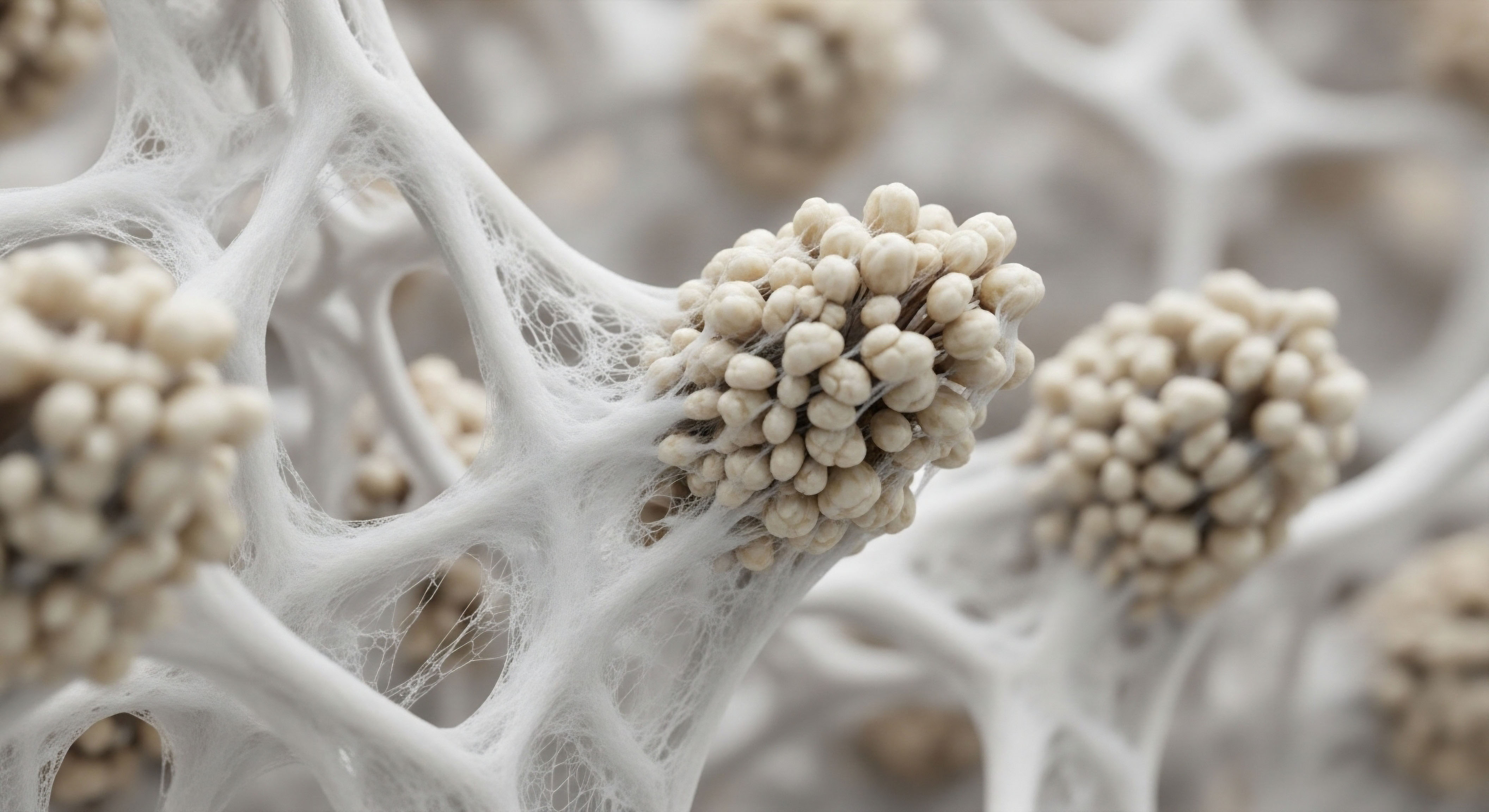

Understanding Your Biological Blueprint
Many individuals experience subtle yet persistent shifts within their bodies ∞ a persistent fatigue, changes in mood, a recalcitrant weight gain, or a diminishing sense of vitality. These experiences often prompt a deep desire for clarity and a pathway back to optimal function.
You recognize these sensations as signals, an intrinsic communication from your biological systems indicating a departure from equilibrium. Personalized wellness protocols, precisely calibrated to your unique physiology, offer a powerful means to address these imbalances. Yet, the profound efficacy of these tailored interventions hinges upon a dynamic partnership with your daily existence. Your lifestyle choices are not peripheral considerations; they are active modulators, constantly interacting with and shaping the very foundations of your hormonal and metabolic health.
The endocrine system orchestrates a complex symphony of communication throughout your body, with hormones acting as vital messengers. These chemical signals regulate everything from your energy production and sleep cycles to your mood and reproductive health. When this intricate network functions optimally, you experience a sense of profound well-being and resilience. When imbalances arise, the cascade of effects can be far-reaching, influencing every aspect of your physical and cognitive experience.
Personalized wellness protocols offer a pathway to restore physiological balance, with lifestyle choices serving as crucial, dynamic modulators of their effectiveness.

The Endocrine System a Dynamic Network
Consider the endocrine system a sophisticated internal messaging service, continuously adapting its output based on a myriad of internal and external cues. Glands such as the thyroid, adrenals, and gonads synthesize and release hormones, which then travel through the bloodstream to target cells, initiating specific biological responses. This intricate feedback loop ensures that hormone levels remain within a tightly regulated range, maintaining homeostasis. Disruptions to this delicate balance manifest as the symptoms many individuals experience, signaling a need for recalibration.

How Hormones Orchestrate Daily Function
Each hormone plays a distinct, yet interconnected, role. Cortisol, for instance, a product of the adrenal glands, manages your body’s stress response and influences glucose metabolism. Thyroid hormones regulate your metabolic rate, affecting energy levels and body temperature. Testosterone and estrogen, synthesized in the gonads, govern reproductive health, bone density, muscle mass, and cognitive function in both men and women.
Understanding these fundamental roles provides a lens through which to view your symptoms, translating them into insights about your body’s internal workings.


Optimizing Protocols through Lifestyle Integration
For those already familiar with the foundational principles of hormonal health, the discourse shifts to the precise interplay between tailored wellness protocols and daily living. Therapeutic interventions, such as hormonal optimization protocols and peptide therapies, represent sophisticated tools designed to restore physiological equilibrium.
The degree to which these interventions yield their full therapeutic potential is profoundly influenced by the synergistic relationship they share with an individual’s lifestyle. Lifestyle factors are not merely supportive elements; they are active participants in the biochemical recalibration process, either enhancing or attenuating the intended effects of targeted treatments.
Tailored wellness protocols are designed with meticulous attention to individual biomarkers and symptom profiles. However, their pharmacological efficacy, encompassing both pharmacokinetics (how the body processes the substance) and pharmacodynamics (how the substance affects the body), is subject to the continuous influence of external variables.
These variables include nutritional intake, physical activity patterns, sleep architecture, and chronic stress exposure. Each of these elements directly impacts cellular receptor sensitivity, enzyme activity, and the overall metabolic milieu, thereby dictating the responsiveness of the biological system to exogenous agents.
Lifestyle choices directly influence the pharmacokinetics and pharmacodynamics of hormonal and peptide therapies, determining their ultimate effectiveness.

Testosterone Optimization and Lifestyle Modulators
Consider testosterone optimization protocols, which are frequently employed for men experiencing symptoms of low testosterone (andropause) and for women seeking improved energy, mood, and libido. For men, weekly intramuscular injections of Testosterone Cypionate, often paired with Gonadorelin to preserve natural production and fertility, and Anastrozole to manage estrogen conversion, establish a new hormonal baseline.
For women, lower doses of Testosterone Cypionate, administered subcutaneously, often alongside progesterone, address specific symptomatic presentations. The success of these regimens hinges on consistent adherence to supporting lifestyle practices.
- Sleep Quality ∞ Adequate, restorative sleep directly influences the pulsatile release of endogenous growth hormone and supports the hypothalamic-pituitary-gonadal (HPG) axis, which governs testosterone production. Compromised sleep can blunt the body’s response to exogenous testosterone.
- Nutritional Biochemistry ∞ A balanced diet, rich in micronutrients and healthy fats, provides the necessary precursors for hormone synthesis and supports metabolic pathways involved in hormone breakdown and elimination. For instance, dietary choices influence the activity of aromatase, the enzyme responsible for converting testosterone to estrogen, directly impacting the need for medications like Anastrozole.
- Physical Movement ∞ Regular resistance training and high-intensity interval training stimulate growth hormone release and improve insulin sensitivity, creating an anabolic environment that complements testosterone’s effects on muscle mass and body composition.

Peptide Therapy and Synergistic Living
Growth hormone peptide therapies, utilizing agents like Sermorelin, Ipamorelin, or CJC-1295, aim to stimulate the body’s natural production of growth hormone, offering benefits such as improved body composition, enhanced recovery, and better sleep. Other targeted peptides, such as PT-141 for sexual health or Pentadeca Arginate (PDA) for tissue repair, also demonstrate heightened efficacy when integrated within a conducive lifestyle framework.
The impact of lifestyle on peptide therapy is particularly striking. For example, the effectiveness of growth hormone secretagogues in promoting muscle gain and fat loss is significantly amplified by a consistent resistance training regimen and a protein-rich diet. These lifestyle factors provide the necessary stimuli and building blocks for the cellular processes that peptides are designed to enhance.
The following table illustrates how specific lifestyle factors can modulate the efficacy of various wellness protocols ∞
| Wellness Protocol | Lifestyle Factor | Enhancing Effect | Attenuating Effect |
|---|---|---|---|
| Testosterone Replacement | Quality Sleep | Optimized receptor sensitivity, improved endogenous support | Reduced receptor sensitivity, impaired HPG axis function |
| Testosterone Replacement | Nutrient-Dense Diet | Balanced estrogen metabolism, robust hormone synthesis | Dysregulated estrogen conversion, inflammatory burden |
| Growth Hormone Peptides | Resistance Training | Amplified muscle protein synthesis, accelerated fat oxidation | Diminished anabolic response, slower tissue repair |
| Growth Hormone Peptides | Stress Management | Reduced cortisol interference, enhanced cellular regeneration | Elevated cortisol, catabolic state, blunted peptide action |
| Thyroid Optimization | Gut Health Support | Improved T4 to T3 conversion, reduced systemic inflammation | Impaired nutrient absorption, increased autoimmune activity |


Epigenetic Modulation and Endocrine Responsiveness
The advanced understanding of how lifestyle factors significantly alter the efficacy of tailored wellness protocols extends into the realm of epigenetics and cellular plasticity. This deep dive moves beyond mere correlation, exploring the intricate molecular mechanisms by which daily habits exert their influence on gene expression and, consequently, on the responsiveness of the endocrine system to therapeutic interventions.
The human biological system possesses a remarkable capacity for adaptation, a phenomenon profoundly shaped by the epigenetic landscape, which acts as an interface between genetic predisposition and environmental exposure.
Epigenetic modifications represent heritable changes in gene function without alterations to the underlying DNA sequence. These mechanisms, including DNA methylation, histone modification, and microRNA regulation, dictate whether specific genes are actively transcribed or silenced. Environmental and lifestyle stressors profoundly disturb these epigenetic patterns, inducing long-term changes that can impact endocrine function and metabolic health. These modifications determine the efficiency of hormone synthesis, the density and sensitivity of hormone receptors, and the metabolic pathways responsible for hormone activation and deactivation.
Epigenetic mechanisms link genetics and environment, explaining the variability and reversibility of the endocrine system’s response to lifestyle changes.

The Gut Microbiome and Hormonal Crosstalk
A particularly compelling area of inquiry involves the gut microbiome and its profound, yet often underestimated, influence on systemic hormonal balance. The collective genetic material of gut microbes, known as the metagenome, contributes to the host’s metabolic phenotype.
Certain bacterial communities within the gut produce enzymes, such as beta-glucuronidase, which can deconjugate hormones like estrogen, returning them to an active state. This process, occurring within the “estrobolome,” directly impacts circulating estrogen levels and influences the efficacy of exogenous hormonal optimization protocols. An imbalanced gut microbiome, or dysbiosis, can therefore disrupt estrogen metabolism, potentially diminishing the desired effects of carefully titrated estrogen or testosterone (which aromatizes to estrogen) therapies.

Mitochondrial Function and Energetic Coupling
Mitochondria, the cellular powerhouses, play a critical role in energy production and directly influence the responsiveness of cells to hormonal signals. Lifestyle factors such as chronic exercise and nutrient availability profoundly impact mitochondrial biogenesis and function. For instance, high-intensity interval training stimulates the expression of genes involved in mitochondrial proliferation and efficiency.
This enhanced mitochondrial capacity translates into improved cellular energy status, which is essential for hormone receptor signaling cascades and downstream cellular responses. Conversely, sedentary lifestyles and chronic caloric excess can lead to mitochondrial dysfunction, impairing cellular energy production and rendering cells less responsive to both endogenous hormones and exogenous therapeutic agents. Research highlights the potential of AMPK-targeting peptides to promote mitochondrial fission, enhancing cellular energy production and improving high blood glucose levels in metabolic disorders.

Circadian Rhythms and Endocrine Synchronization
The body’s intricate hormonal systems operate within a precise circadian rhythm, a 24-hour cycle influenced primarily by light-dark exposure. This internal clock synchronizes numerous physiological processes, including the pulsatile release of cortisol, growth hormone, and melatonin. Disruptions to this rhythm, often induced by irregular sleep patterns, artificial light exposure at night, or shift work, can profoundly desynchronize endocrine signaling.
Such desynchronization can reduce the efficacy of hormonal optimization protocols, as the body’s cells may be less receptive to hormone signals at inappropriate times. For example, growth hormone release peaks during deep sleep; therefore, consistent, high-quality sleep is not merely beneficial, but a fundamental prerequisite for maximizing the anabolic and regenerative effects of growth hormone peptide therapy.
The table below outlines key molecular targets influenced by lifestyle factors, demonstrating their direct impact on endocrine function and protocol efficacy ∞
| Molecular Target | Lifestyle Influence | Impact on Endocrine Function / Protocol Efficacy |
|---|---|---|
| Hormone Receptors | Diet, Stress, Sleep | Altered receptor density and sensitivity, affecting hormone binding |
| Aromatase Enzyme Activity | Nutrition (e.g. cruciferous vegetables), Body Fat Percentage | Modulation of testosterone-to-estrogen conversion rates |
| DNA Methylation Patterns | Diet (e.g. folate, B12), Environmental Toxins, Stress | Epigenetic regulation of hormone synthesis genes and receptor genes |
| Mitochondrial Biogenesis | Exercise (e.g. HIIT), Caloric Restriction | Enhanced cellular energy, improved responsiveness to anabolic hormones |
| Gut Microbiome Composition | Diet (e.g. fiber, prebiotics), Antibiotic Use | Modulation of hormone metabolism and reabsorption (estrobolome) |

References
- Ling, C. & Rönn, T. (2019). How lifestyle affects our genes. Cell Metabolism.
- He, L. (2023). Novel Peptide Therapy Shows Promise for Treating Obesity, Diabetes and Aging. Cell Chemical Biology.
- Katz, N. (2023). Menopause ∞ Study lists the benefits of hormone replacement therapy. MedicalNewsToday.
- Ling, C. & Rönn, T. (2019). Epigenetics meets endocrinology. PubMed Central.
- Lewis, L. (2025). Health Impacts of Epigenetics & Hormone Interactions.
- Bailey, E. (2023). Menopause ∞ New study lists the benefits of hormone replacement therapy. MedicalNewsToday.
- Lewis, L. (2025). Hormonal, Metabolic Pathways & the Epigenome.
- Lewis, L. (2025). Epigenetics & Disrupted Cell Signaling.
- Ling, C. & Rönn, T. (2019). The epigenetic aging, obesity, and lifestyle. Frontiers.
- Patel, S. & Bhardwaj, A. (2024). Hormone Replacement Therapy. StatPearls – NCBI Bookshelf.

Reclaiming Your Vitality
This exploration into the intricate relationship between lifestyle factors and the efficacy of tailored wellness protocols provides a powerful framework for understanding your own biological narrative. The knowledge gained here is a foundational step, a lens through which to view your daily choices not as isolated acts, but as profound determinants of your internal environment.
Your personal journey toward optimal health is a dynamic, ongoing dialogue between your unique physiology and the world around you. This understanding empowers you to become an active co-author of your well-being, translating complex biological science into a deeply personal path of vitality and function without compromise.



